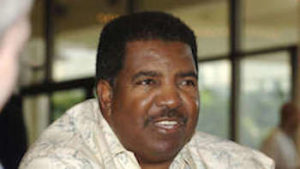
Dennis Green
*Dennis Green was born on this date in 1949. He was a Black college and professional football coach.
Dennis Earl Green grew up in a working-class household in Harrisburg, Pennsylvania. His father was a postal worker, and his mother was a beautician. His father died when Green was 11, and his mother died when he was 13. Green attended John Harris High School in Harrisburg and graduated cum laude from the University of Iowa with a B.A. in finance. If his football career didn't pan out, Green aspired to be a high school teacher. In college, he started as a halfback in his three seasons with the Iowa Hawkeyes. He played briefly for the BC Lions of the Canadian Football League in 1971.
After retiring as a player, he became an assistant coach at the University of Dayton, the University of Iowa, and Stanford University. In 1981, Green was named the head coach of Northwestern University, a school that had gone 1-31-1 in its last 33 games. He was only Division I-A's second African American head coach that year. Green was named the Big Ten Conference Coach of the Year, chosen by writers and broadcasters, in 1982 at Northwestern. He left Northwestern in 1985 and became receiver’s coach for the San Francisco 49ers under his former boss at Stanford, Bill Walsh. In 1989, Green took the head coaching position at Stanford University, inheriting a team that had graduated 17 of its 21 starters from 1988. Green led the Cardinal from 1989 to 1991.
In January 1992, Green was named 5th head coach of the Minnesota Vikings, replacing the retiring Jerry Burns. The day he was introduced as the Vikings' head coach, he announced that there was a "new sheriff in town." At that time, he was only the second Black head coach after Art Shell in the modern NFL era and only the third of all time after Fritz Pollard and Shell. Through his first six years with the team, Green never posted a losing record and failed to qualify for the playoffs only once. Initially, Green earned widespread praise for turning around what had recently been a lackluster franchise.
During his tenure in Minnesota, Green established the “Bakers Club,” a networking group of minority business owners and entrepreneurs throughout Minnesota. The high point of Green's Vikings career was the 1998 season when the team scored 15–1 and set the NFL record for the most points in a season. In 2001, the Vikings finished with the team with a losing record for the first time in Green's decade.
The Vikings bought out Green's contract on January 4, 2002. After spending two seasons as an analyst for ESPN, Green was hired as head coach by the Arizona Cardinals on January 7, 2004, until 2009. Through his first two years with the team, Green totaled 11 wins with the Cardinals and finished 3rd and 2nd in the NFC West, an improvement over predecessor Dave McGinnis. During this time, he was reunited with Larry Fitzgerald Jr., a former ball boy with Green’s Vikings and now one of the top wide receivers in the history of the NFL.
After Arizona in 2009, Green coached the California Redwoods during the United Football League's inaugural season for three more years. After leaving the team, Green sued the league for lack of payment on a $1.5 million contract for the 2011 season. An arbitrator awarded Green $990,000 for the 2011 season, which was upheld in 2014 by a San Francisco Superior Court judge. The judgment was never collected because of the league's poor financial condition.
On July 21, 2016, Green died at 67 following a heart attack. His wife and four children survived him. After his death, the Vikings team said, "He mentored countless players and was a father figure for the men he coached. He took great pride in helping assistant coaches advance their careers. His tenure as one of the first African American head coaches in college and the NFL was also transformative. Our thoughts and prayers are with the entire Green family."